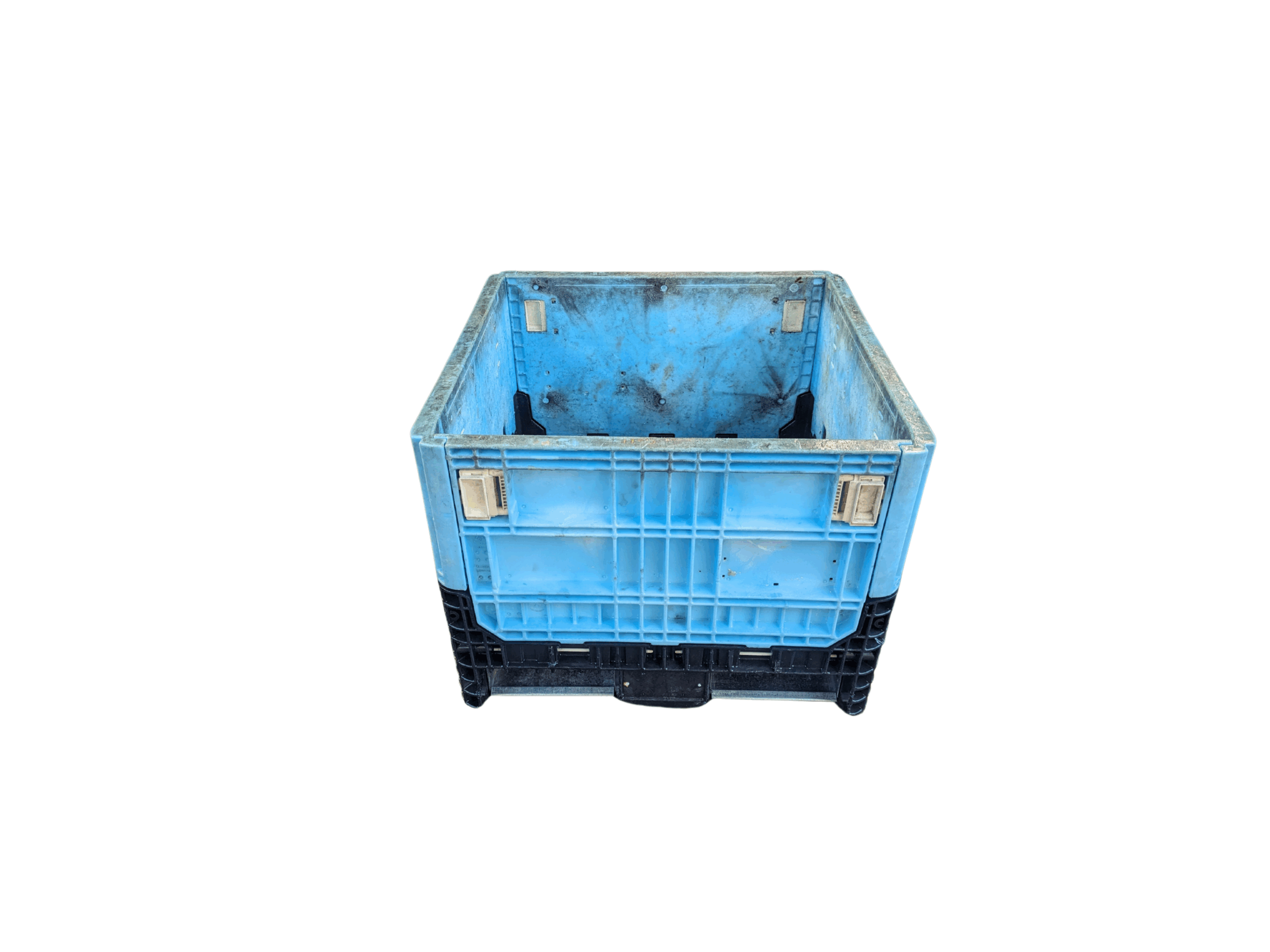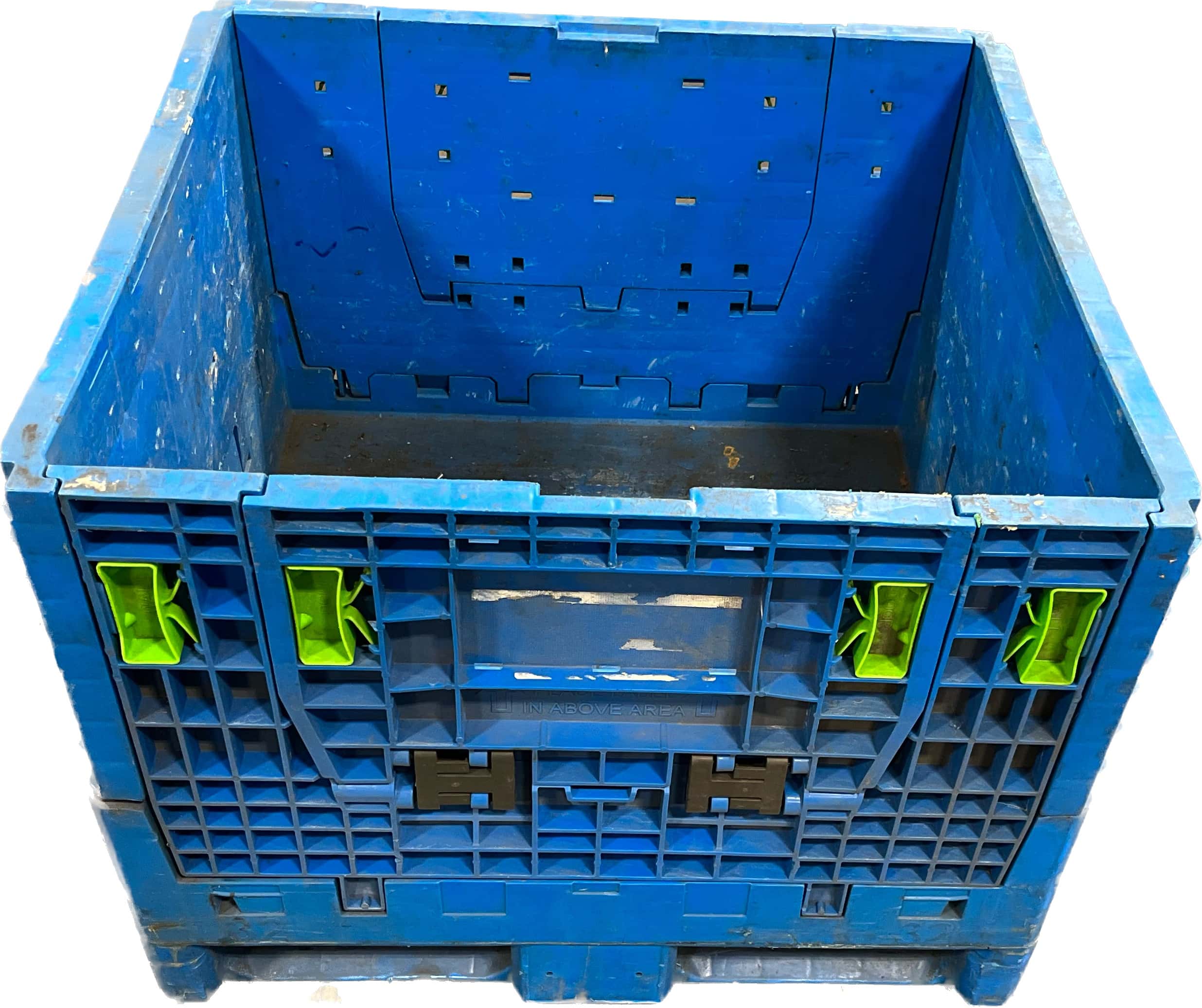Why Mass Containers Are Necessary for Sustainable and Affordable Transportation
Bulk containers play an important duty in modern logistics. They promote the effective activity of big amounts of products, consequently optimizing transport processes. This approach not just reduces prices however also lessens environmental impact with reduced discharges and waste generation. As sectors look for even more sustainable practices, the adoption of bulk containers is coming to be increasingly considerable. What effects does this change hold for future logistics and supply chain management?

The Advantages of Making Use Of Mass Containers in Logistics
Bulk containers change logistics by enhancing performance and sustainability. These containers allow for the transportation of huge amounts of items in a single trip, considerably minimizing the variety of trips required. This not just simplifies operations yet additionally decreases labor prices connected with handling, filling, and discharging. In addition, bulk containers are made to maximize space application within transport automobiles, guaranteeing that even more items can be shipped concurrently.
The standardization of bulk containers additionally simplifies the logistics process. With uniform measurements, they can be easily stacked and saved, causing improved stockroom administration. In addition, mass containers usually include sturdy products that secure components from damage during transportation, consequently decreasing item loss and enhancing total reliability. Consequently, companies can experience improved supply chain efficiency, inevitably leading to boosted success and client fulfillment. This combination of aspects makes mass containers a crucial possession in modern-day logistics.
Ecological Influence: Lowering Waste and Carbon Footprint
As sectors progressively focus on sustainability, the fostering of bulk containers has actually emerged as a key technique for minimizing waste and lowering carbon footprints. These containers minimize making use of packaging materials, such as boxes and plastic, thereby especially decreasing total waste generation. By combining shipments, bulk containers improve transport efficiency, allowing for even more items to be transported per journey. This decrease in trips straight associates with reduced greenhouse gas emissions, adding to a smaller sized carbon footprint.
Furthermore, mass containers can frequently be recycled or recycled, further alleviating environmental impact. The resilience of these containers warranties they can endure several transportation cycles, minimizing the demand for single-use choices. used plastic containers. By enhancing logistics and promoting reliable source usage, bulk containers not just sustain sustainable methods but likewise motivate markets to line up with international ecological objectives. Inevitably, their execution shows a commitment to ecological stewardship and accountable resource management
Price Cost Savings: Exactly How Bulk Containers Lower Transportation Expenses
While several companies look for means to enhance their profits, using mass containers presents a considerable possibility for reducing transportation expenditures. Mass containers optimize the quantity of products carried, permitting services to ship bigger quantities at the same time. This effectiveness minimizes the variety of trips required, directly reducing gas prices and minimizing labor expenses related to loading and dumping.
Additionally, bulk containers frequently include structured styles that maximize room application within transport lorries. This implies less voids, resulting in a lot more effective use readily available capacity. Moreover, the resilience of bulk containers can lower the threat of item damages during transportation, guaranteeing and minimizing losses that even more goods show up intact.
Enhancing Supply Chain Performance With Bulk Storage Solutions
Bulk storage remedies play a vital role in boosting supply chain efficiency by maximizing stock administration. By consolidating items into less, bigger containers, organizations can greatly lower managing prices connected with constant transfers and processing. This streamlined technique enables far better tracking and monitoring of supply, eventually resulting in improved operational performance.
Streamlined Supply Monitoring
Effective stock management is crucial for maximizing supply chain procedures, especially when companies take on bulk storage space options. These services allow services to preserve greater stock degrees while lessening the frequency of replenishment. By combining products into bulk containers, companies can streamline their inventory processes, decreasing the intricacy associated with tracking several smaller sized plans. This strategy helps with accurate supply counts and enhances projecting accuracy, enabling more educated decision-making. In enhancement, bulk storage space options streamline stockroom company, making it less complicated to find and gain access to products when required. As a result, organizations can attain a much more effective inventory turn over rate, inevitably enhancing total supply chain performance and decreasing the likelihood of stockouts or overstock situations.

Lowered Handling Costs
The execution of bulk storage space remedies not just enhances supply administration however likewise significantly decreases managing costs throughout the supply chain. By combining materials right into bulk containers, companies lessen the demand for frequent handling and transfer between various storage and transport units. This approach lowers labor costs related to loading, discharging, and relocating smaller sized packages. Furthermore, bulk storage space reduces the frequency of shipments, causing lower transport costs and decreased gas intake. Therefore, businesses can enhance their logistics procedures, permitting an extra effective appropriation of sources. Ultimately, reduced handling costs add to improved general supply description chain efficiency, cultivating an environment that sustains both sustainability and financial stability.
Convenience of Bulk Containers Throughout Various Industries
Although several sectors have unique needs for transportation and storage space, bulk containers have actually become a flexible service that meets a variety of needs. These containers, varying from huge containers to specialized storage tanks, can fit diverse products, consisting of granules, powders, and liquids. In the agricultural sector, mass containers facilitate the transportation of grains and plant foods, while the food and beverage sector utilizes them for components and finished items. The chemical industry relies upon bulk containers for securely carrying dangerous products, making certain conformity with safety and security laws. In addition, construction companies profit from bulk containers for delivering accumulations and various other materials. Their versatility includes various settings of transportation, consisting of trucks, trains, and ships, enhancing logistical efficiency. This convenience not just simplifies operations throughout various markets yet likewise advertises sustainability by decreasing packaging waste and optimizing room in transportation. Mass containers play an important role in modern supply chain management.
Future Trends in Mass Container Use and Sustainability
The future of mass container use is significantly shaped by innovative products advancement that enhances sustainability. In addition, automation in logistics assures to enhance operations, reducing waste and enhancing efficiency. Welcoming circular economy practices will certainly better change exactly how bulk containers are designed, made use of, and recycled, promoting a much more lasting transport landscape.
Ingenious Products Advancement
As sectors increasingly focus on sustainability, cutting-edge products advancement in mass containers emerges as a significant consider enhancing green transportation remedies. Scientists and manufacturers are discovering biodegradable plastics, recycled composites, and lightweight steels to decrease ecological influence. These products not only reduce waste but also improve fuel efficiency by lowering the overall weight of containers. In addition, innovations in clever materials, which can adapt to differing conditions, boost the longevity and capability of bulk containers. The combination of these ingenious materials aligns with round economic situation principles, promoting reuse and recycling. As the demand for lasting techniques expands, the advancement of such materials will certainly play an important duty fit the future of bulk container use in logistics and transportation.
Automation in Logistics
Considerable advancements in automation are positioned to change logistics and the utilization of bulk containers, improving sustainability in transportation. Automated systems, consisting of drones and independent lorries, are improving the movement of bulk containers, minimizing the dependence on conventional fuel-powered transportation. These technologies optimize routing and packing processes, improving and minimizing empty miles gas effectiveness. In addition, automated supply monitoring systems enhance monitoring and surveillance of bulk containers, ensuring better resource allotment and reduced waste. The integration of the Internet of Things (IoT) enables real-time data evaluation, making it possible for positive decision-making that straightens with sustainability objectives. As automation remains to advance, it is anticipated to drive additionally innovations in mass container use, ultimately supporting more sustainable logistics methods and minimizing the ecological impact of transport.
Round Economy Practices
Improvements in automation are setting the phase for an extra integrated technique to circular economic situation techniques in the domain of mass container usage. As markets progressively welcome sustainability, mass containers are being developed for durability and reusability. This shift not just click for info reduces waste yet likewise improves resource performance. Companies are taking on techniques such as closed-loop systems, where made use of containers are collected, reconditioned, and reestablished into the supply chain. Furthermore, clever innovations track container life cycles, helping with better management and decreasing ecological effect. The partnership between makers, logistics suppliers, and end-users is necessary in developing standards for lasting container usage. refurbished bulk containers. Future patterns suggest an expanding emphasis on products that are biodegradable and recyclable, further reinforcing the circular economic situation's concepts in bulk transport

Often Asked Inquiries
What Products Are Bulk Containers Generally Made From?
Bulk containers are typically created from resilient products such as high-density polyethylene, light weight aluminum, steel, and cardboard. These products provide strength, security, and adaptability, making them ideal for delivering different items in various markets effectively.
Just how Do I Pick the Right Dimension Bulk Container?
Choosing the appropriate size mass container involves reviewing the volume of materials to be moved, taking into consideration taking care of devices compatibility, and appraising storage room requirements. Proper size assurances effectiveness in transport and lessens waste during shipment.
Are Mass Containers Reusable or Recyclable?
Mass containers are usually recyclable, created for numerous journeys, improving sustainability. Lots of can likewise be recycled, relying on the products utilized. Picking recyclable choices better reduces and supports environmental objectives waste in transport methods.
What Safety Rules Put On Mass Container Transport?
Safety guidelines for mass container transport consist of conformity with the Department of Transportation standards, proper labeling of dangerous materials, architectural stability assessments, and adherence to weight limitations to ensure safe handling and prevent crashes throughout transit.
Exactly How Can Services Transition to Utilizing Mass Containers Successfully?
Services can alter to bulk containers by evaluating existing logistics, educating staff on handling, spending in appropriate equipment, enhancing stock management, and teaming up Continued with providers to guarantee compatibility and effectiveness throughout the supply chain.
As markets progressively focus on sustainability, the fostering of mass containers has actually arised as an essential strategy for reducing waste and lowering carbon footprints. By combining materials into mass containers, companies can improve their stock procedures, lowering the complexity linked with tracking numerous smaller sized packages. As markets increasingly prioritize sustainability, cutting-edge materials advancement in bulk containers emerges as a considerable variable in improving eco-friendly transportation options. Automated systems, including drones and self-governing lorries, are improving the motion of bulk containers, lowering the reliance on standard fuel-powered transportation. Additionally, automated stock administration systems enhance monitoring and surveillance of bulk containers, ensuring much better resource allowance and lowered waste.